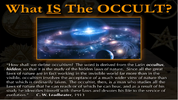Andrey
Jedi
Hello.
I've recently been tracing the history of the western esoteric tradition, and was wondering if there's anything worth studying in terms of their teachings and philosophies. Apart from the ritual magic, are their systems worth studying from an armchair perspective (without rituals) for the purpose of gaining knowledge about the nature of consciousness and the universe? I'm talking about the study of kaballah, hermetic qabalah combined with tarot and western astrology, study of the elements, etc. I don't know much about these things, and was wondering if there's any authenticity to their teachings. Or is it just a lot of disinformation? I've heard some of the arguments where they say that these systems in the western mystery traditions can be useful for studying the nature of the psyche and the universe, but what do you guys think? Is it worth studying this stuff?
I've recently been tracing the history of the western esoteric tradition, and was wondering if there's anything worth studying in terms of their teachings and philosophies. Apart from the ritual magic, are their systems worth studying from an armchair perspective (without rituals) for the purpose of gaining knowledge about the nature of consciousness and the universe? I'm talking about the study of kaballah, hermetic qabalah combined with tarot and western astrology, study of the elements, etc. I don't know much about these things, and was wondering if there's any authenticity to their teachings. Or is it just a lot of disinformation? I've heard some of the arguments where they say that these systems in the western mystery traditions can be useful for studying the nature of the psyche and the universe, but what do you guys think? Is it worth studying this stuff?



